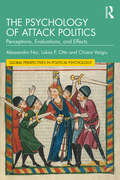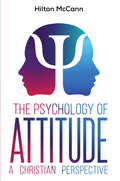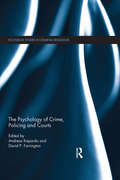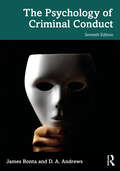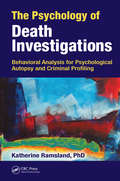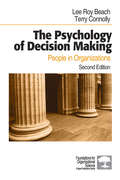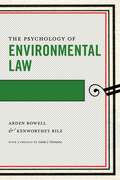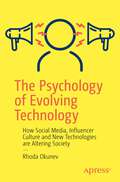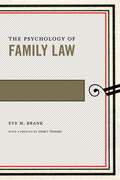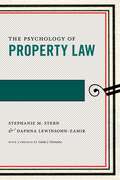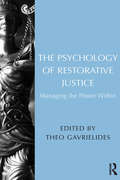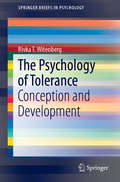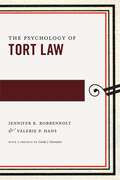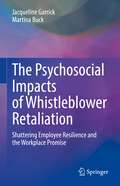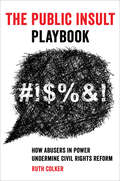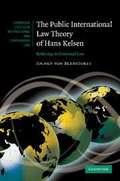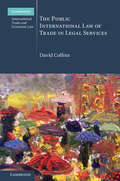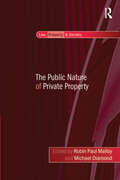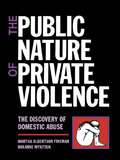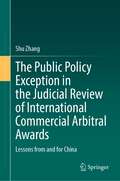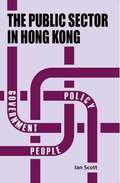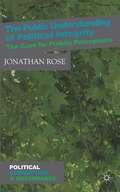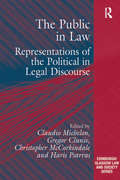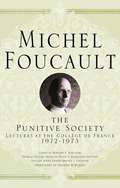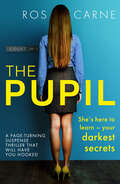- Table View
- List View
The Psychology of Attack Politics: Perceptions, Evaluations and Effects (Global Perspectives in Political Psychology)
by Alessandro Nai Lukas P. Otto Chiara VargiuThe Psychology of Attack Politics explores the use of political attacks in election campaigns, and the way in which their, often deliberate, use impacts voters and has wide reaching societal consequences.With most elections being fraught with tension, disrespectful treatment of political opponents, and political incivility, this timely book aims to disentangle the dynamics of how attack politics is perceived (e.g., whether citizens perceive a negative message to be, indeed, negative) and evaluated (i.e., whether citizens like or dislike attack politics). The book also looks at the effects of attack politics, for instance, whether exposure to negative or uncivil messages alters attitudes and behaviors, such as turnout, affective polarization, and support for political violence. The authors provide a systematic conceptualization of attack politics, made up of negativity, incivility, and intolerance. Focusing on cutting- edge research in political psychology, political communication, and electoral behavior, the authors make the central argument that to understand the effects of different forms of attack politics, there should be a strong focus on individual differences in message perception and evaluation.Exploring what ultimately drives the effects of negative, uncivil, and intolerant rhetoric, and analyzing the phenomena at the center of current scientific and public discourse, this is a fascinating reading for academics and students in psychology, political science, sociology, and communication, as well as anyone interested in political campaigning and elections.
The Psychology of Attitude: A Christian Perspective
by Hilton McCannHave you ever heard someone say ‘I don’t like your attitude!’ or ‘that person has the right attitude’? Maybe these words were said to you? What is meant when ‘attitude’ is referred to in these ways? More fundamentally, what is attitude? Where does it come from and what is its significance? This text addresses these issues and explores the linkage between the diverse stimuli that give rise to attitudes and the action arising (which may be visible or invisible, positive or negative and active or passive). All human beings have attitudes. Attitudes are a significant part of humankind’s framework – not least because they affect behaviour – but attitude is especially significant for Christians. A Christian’s attitude should be the same as that of Christ Jesus (Philippians 2:5) – but what does that mean? The text explores Christ’s attitude and the consequent daily implications. Our tri-partite human framework and the relationship between all those factors emanating from our soul, spirit and body that combine to produce our personal attitudes are examined. Our behaviour to each other is described and contrasted with the way Christ intends us to be. This leads into an examination of Christ’s on-going attitude to humankind. Using the model provided, readers will be able to assess whether they believe they need to change their attitudes to more precisely reflect the Christian way. This text is potentially transformational in helping people examine and refine their attitudes in Christian service.
The Psychology of Crime, Policing and Courts (Routledge Studies in Criminal Behaviour)
by David P. Farrington Andreas KapardisThis book brings together an international group of experts to present cutting-edge psychological research on crime, policing and courts. With contributors from the UK, Germany, Italy, Norway, Cyprus, Israel, Canada and the USA, this volume explores some of the most interesting and contemporary areas of criminological and legal psychology. The Psychology of Crime, Policing and Courts is divided into three parts. Part I explores crime and anti-social behaviour, including the concentration of offending within families, juvenile delinquency, adolescent bullying, cyberbullying, violence risk assessment, and psychopathy. Part II examines policing and the detection of deception, with chapters on interrogational practices, police interviews of children, and modern detection methods. Part III focuses on courts and sentencing, with chapters exploring wrongful convictions, the role of juries, extra-legal factors in sentencing decisions and an examination of sentencing itself. Representing the forefront of research in developmental criminology and criminological and legal psychology, this book is a comprehensive resource for undergraduate and postgraduate students studying psychology and criminology, with particular value for those studying forensic psychology. This book is also a valuable resource for psychologists, lawyers, social scientists and law enforcement personnel.
The Psychology of Criminal Conduct
by James Bonta D. A. AndrewsThe Psychology of Criminal Conduct, Seventh Edition, provides a psychological and evidence-informed perspective of criminal behavior that sets it apart from many criminological and mental health explanations of criminal behavior. Drawing upon the General Personality and Cognitive Social Learning theory, James Bonta and Donald Andrews provide an overview of the theoretical context and major knowledge base of the psychology of criminal conduct, discuss the eight major risk/need factors of criminal conduct, examine the prediction and classification of criminal behavior along with prevention and rehabilitation, and summarize the major issues in understanding criminal conduct. This book also offers the Risk-Need-Responsivity (RNR) model of assessment and treatment that has guided developments in the subject throughout the world. Bonta carefully maintains the book’s original contributions while presenting core concepts succinctly, clearly, and elegantly. Appropriate for advanced undergraduates and graduate students as well as for scholars, researchers, and practitioners, The Psychology of Criminal Conduct, Seventh Edition, further extends and refines the authors’ body of work. The book is extended and enhanced by a website that includes: A curated selection of videos, webinars and podcast episodes, bringing together diverse voices from leaders across the field of corrections and criminal psychology Technical notes providing additional context and detail to concepts explored in the book Interactive quizzes to test understanding and support study Lecture slides, exercises and test banks designed to save instructors time
The Psychology of Death Investigations: Behavioral Analysis for Psychological Autopsy and Criminal Profiling
by Katherine RamslandThe Psychology of Death Investigations outlines definitively how behavioral evidence can often provide the necessary components and "missing pieces" to complement physical evidence as an essential tool for incident reconstruction. In order to determine the direction of an investigation and to prioritize leads, if necessary, death investigators must establish the manner of a death: natural, accident, homicide or suicide. The most overlooked aspect of death investigation is the psychological dimension, which can provide unique leads, correct false assumptions, enhance investigative awareness, and solve cases in surprising ways. In an estimated 10–20% of cases, the manner of death cannot be determined, or worse, has been erroneously categorized. Since many jurisdictions can’t afford behavioral consultants, this book has been written to provide practical information for a basic psychological analysis. If the circumstances surrounding a death are equivocal, psychological consultants can compile information retrospectively about a deceased person’s mental state and possible motive to assist with unravelling ambiguity about the manner of death. This is the primary function of a psychological autopsy, and, as such, this is the first book of its kind dedicated solely to the topic. In the event that the manner of death is determined to be a homicide, behavioral profiling can help to focus the potential pool of suspects. Professionals and students alike will benefit from the exercise of cognitive awareness and the application of psychological logic presented. Psychologists, medical examiners, coroners, attorneys, fraud examiners, law enforcement personnel, death and homicide investigators, and students enrolled in criminal profiling, forensic psychology, and criminal justice programs will find this text to be a compelling and insightful reference to add to their professional toolkit.
The Psychology of Decision Making: People in Organizations (2nd Edition)
by Professor Lee Roy Beach Dr Terry ConnollyThe Psychology of Decision Making provides an overview of decision making as it relates to management, organizational behavior issues, and research. This engaging book examines the way individuals make decisions as well as how they form judgments privately and in the context of the organization. It also discusses the interplay of group and institutional dynamics and their effects upon the decisions made within and on the behalf of organizations.
The Psychology of Environmental Law (Psychology and the Law)
by Arden Rowell Kenworthey Bilz Linda J DemaineOffers psychological insights into how people perceive, respond to, value, and make decisions about the environmentEnvironmental law may seem a strange space to seek insights from psychology. Psychology, after all, seeks to illuminate the interior of the human mind, while environmental law is fundamentally concerned with the exterior surroundings—the environment—in which people live.Yet psychology is a crucial, undervalued factor in how laws shape people’s interactions with the environment. Psychology can offer environmental law a rich, empirically informed account of why, when, and how people act in ways that affect the environment—which can then be used to more effectively pursue specific policy goals. When environmental law fails to incorporate insights from psychology, it risks misunderstanding and mispredicting human behaviors that may injure or otherwise affect the environment, and misprescribing legal tools to shape or mitigate those behaviors.The Psychology of Environmental Law provides key insights regarding how psychology can inform, explain, and improve how environmental law operates. It offers concrete analyses of the theoretical and practical payoffs in pollution control, ecosystem management, and climate change law and policy when psychological insights are taken into account.
The Psychology of Evolving Technology: How Social Media, Influencer Culture and New Technologies are Altering Society
by Rhoda OkunevTechnological innovations have advanced at an incredible speed since the introduction of the computer that it has altered the fabric of our society. The possession of computers, smart-devices, along with social media, texting and video games, is now an intimate part of the structure of our culture. This book is a framework to start a conversation on how technology is changing our lifestyles and transforming our world. There is now an entire generation that has been using technology through the most delicate developmental time in their lives. This book presents how to look at the cognitive and psychosocial developmental stages and what are the age-appropriate milestones and factsheet of behaviors at different ages. It provides insight into the strength and vulnerable characteristics at each stage and the prevalence of some negative conditions in our society. You will gain a perspective of the encouraging and challenging aspects of computer learning, smart devices, and how to start and keep the conversation going from infancy to adulthood in order to keep and maintain your virtues and ways to circumvent unfavorable consequences. In short, The Psychology of Evolving Technology looks at how cutting-edge and revolutionary high technologies have disrupted our society through its many luxuries and conveniences and how it has altered the outlook of our values, privileges, and expectations. What You'll LearnDetermine what adjustments should be made to regulate new innovations to allow them to succeed See how development stages in a child now interact with technologyReview how social media and influencer culture are changing the way we see ourselves in society Who This Book Is For All readers curious about the effect of technology on individuals, growing children, and the fabric of society
The Psychology of Family Law (Psychology and the Law #4)
by Eve M. BrankWinner, 2021 Lawrence S. Wrightsman Book Award, given by the American Psychology-Law SocietyBridges family law and current psychological research to shape understanding of legal doctrine and policy Family law encompasses legislation related to domestic relationships—marriages, parenthood, civil unions, guardianship, and more. No other area of law touches so closely to home, or is changing at such a rapid pace—in fact, family law is so dynamic precisely because it is inextricably intertwined with psychological issues such as human behavior, attitudes, and social norms. However, although psychology and family law may seem a natural partnership, both fields have much to learn from each other. Our laws often fail to take into account our empirical knowledge of psychology, falling back instead on faulty assumptions about human behavior. This book encourages our use of psychological research and methods to inform understandings of family law. It considers issues including child custody, intimate partner violence, marriage and divorce, and child and elder maltreatment. For each topic discussed, Eve Brank presents a case, statute, or legal principle that highlights the psychological issues involved, illuminating how psychological research either supports or opposes the legal principles in question, and placing particular emphasis on the areas that are still in need of further research. The volume identifies areas where psychology practice and research already have been or could be useful in molding legal doctrine and policy, and by providing psychology researchers with new ideas for legally relevant research.
The Psychology of Property Law (Psychology and the Law #3)
by Stephanie M. Stern Daphna Lewinsohn-ZamirConsiders how research in psychology offers new perspectives on property law, and suggests avenues of reform Property law governs the acquisition, use and transfer of resources. It resolves competing claims to property, provides legal rules for transactions, affords protection to property from interference by the state, and determines remedies for injury to property rights. In seeking to accomplish these goals, the law of property is concerned with human cognition and behavior. How do we allocate property, both initially and over time, and what factors determine the perceived fairness of those distributions? What social and psychological forces underlie determinations that certain uses of property are reasonable? What remedies do property owners prefer? The Psychology of Property Law explains how assumptions about human judgement, decision-making and behavior have shaped different property rules and examines to what extent these assumptions are supported by the research. Employing key findings from psychology, the book considers whether property law’s goals could be achieved more successfully with different rules. In addition, the book highlights property laws and conflicts that offer productive areas for further behaviorally-informed research. The book critically addresses several topics from property law for which psychology has a great deal to contribute. These include ownership and possession, legal protections for residential and personal property, takings of property by the state, redistribution through property law, real estate transactions, discrimination in housing and land use, and remedies for injury to property.
The Psychology of Restorative Justice: Managing the Power Within
by Theo GavrielidesThis ground-breaking collection dares to take the next step in the advancement of an autonomous, inter-disciplinary restorative justice field of study. It brings together criminology, social psychology, legal theory, neuroscience, affect-script psychology, sociology, forensic mental health, political sciences, psychology and positive psychology to articulate for the first time a psychological concept of restorative justice. To this end, the book studies the power structures of the restorative justice movement, the very psychology, motivations and emotions of the practitioners who implement it as well as the drivers of its theoreticians and researchers. Furthermore, it examines the strengths and weakness of our own societies and the communities that are called to participate as parties in restorative justice. Their own biases, hunger for power and control, fears and hopes are investigated. The psychology and dynamics between those it aims to reach as well as those who are funding it, including policy makers and politicians, are looked into. All these questions lead to creating an understanding of the psychology of restorative justice. The book is essential reading for academics, researchers, policymakers, practitioners and campaigners.
The Psychology of Tolerance: Conception and Development (SpringerBriefs in Psychology)
by Rivka T. WitenbergThis book offers a new standpoint to understanding tolerance to human diversity by approaching it from the perspectives of cognitive, developmental and prosocial psychology. Emphasising the positive aspects of social perception and behaviour, it invites readers to re-consider ‘tolerance’ not simply as the opposite of prejudice, but as something that can in fact coexist with prejudice and intolerance. Drawing on original empirical research conducted with children, adolescents and young adults, the book maps the response patterns for tolerant judgement and justification, including psycho-developmental factors. It explains how tolerance regarding differences of colour, creed and culture is based on underlying beliefs that guide the reasoning process to support judgements about human diversity. Showcasing emerging theory and a new methodology of data collection that goes beyond common approaches, this book outlines a unique potential developmental trajectory for tolerance to human diversity based on fairness, empathy and reason. The book challenges students, researchers and general readers across the fields of psychology, human ethics and moral philosophy with its new insights into the character of prosocial beliefs.
The Psychology of Tort Law (Psychology and the Law #2)
by Jennifer K Robbennolt Valerie P HansTort law regulates most human activities: from driving a car to using consumer products to providing or receiving medical care. Injuries caused by dog bites, slips and falls, fender benders, bridge collapses, adverse reactions to a medication, bar fights, oil spills, and more all implicate the law of torts. The rules and procedures by which tort cases are resolved engage deeply-held intuitions about justice, causation, intentionality, and the obligations that we owe to one another. Tort rules and procedures also generate significant controversy—most visibly in political debates over tort reform.The Psychology of Tort Law explores tort law through the lens of psychological science. Drawing on a wealth of psychological research and their own experiences teaching and researching tort law, Jennifer K. Robbennolt and Valerie P. Hans examine the psychological assumptions that underlie doctrinal rules. They explore how tort law influences the behavior and decision-making of potential plaintiffs and defendants, examining how doctors and patients, drivers, manufacturers and purchasers of products, property owners, and others make decisions against the backdrop of tort law. They show how the judges and jurors who decide tort claims are influenced by psychological phenomena in deciding cases. And they reveal how plaintiffs, defendants, and their attorneys resolve tort disputes in the shadow of tort law. Robbennolt and Hans here shed fascinating light on the tort system, and on the psychological dynamics which undergird its functioning.
The Psychosocial Impacts of Whistleblower Retaliation: Shattering Employee Resilience and the Workplace Promise
by Jacqueline Garrick Martina BuckThis book analyzes the harms related to whistleblower retaliation, its psychosocial impacts on employees, and the institutional dysfunction it creates and perpetuates. Stigma and biases against whistleblowers interfere with their ability to make protected disclosures when harm to others is at stake. Retaliatory toxic tactics create an atmosphere and corporate culture that embodies fear and encourages bystander behavior. In this book, the authors explore psychosocial impacts across domains that include financial, legal, social, physical, and emotional well-being. Ten of the 14 chapters specifically examine the toxic tactics of retaliation: gaslighting, mobbing, marginalizing, shunning, devaluing, double-binding, career blocking, counter-accusing, bullying, and doxxing. These toxic tactics are the building blocks of workplace traumatic stress (WTS) and can lead to posttraumatic stress disorder (PTSD), depression, substance abuse, and suicide. WTS is a term that differentiates between workplace violence or job stress, which can be components of WTS but do not fully describe the systemic hostile work environment that targets an employee. Understanding WTS and how it disrupts identity, causes moral injury, and shatters world views are important aspects for clinicians treating clients who are victims of this kind of hostile work environment. The Psychosocial Impacts of Whistleblower Retaliation is a useful resource offering a new way for social workers, mental health providers, advocates, and other support services professionals and practitioners to assist whistleblowers. It helps clinicians understand how to view patients suffering from whistleblower retaliation and gives them a lexicon for forensic evaluations. Lawyers, especially those specializing in employment, labor, and Qui Tam cases, also could benefit from having a means to describe the psychosocial impacts of retaliation and WTS on their clients when filing for compensatory damages for pain and suffering during judicial proceedings. Finally, the book could appeal to employees and managers, human resources professionals, victim rights advocates, elected officials, media personnel, and other professionals who are interested in learning more about whistleblower retaliation and its psychosocial and cultural implications.
The Public Insult Playbook: How Abusers in Power Undermine Civil Rights Reform
by Ruth ColkerWhen they go low, we learn: an examination of mudslinging in contemporary American politics—and how the left can find its footing to achieve structural reform in this mess. The rules of the public discourse game have changed, and The Public Insult Playbook argues that the political left needs to account for the power of vitriol in crafting their theories for social and political change. With this book, noted constitutional law expert and disability rights advocate Ruth Colker offers insights into how public insults have come to infect contemporary public discourse—a technique not invented by but certainly refined by Donald Trump—and, importantly, highlights lessons learned and tools for fighting back. Public insults act as a headwind and dead weight to structural reform. By showcasing the power of insults across a number of civil rights battlegrounds, The Public Insult Playbook uncovers the structural nature of personal attacks, and offers a blueprint for a legal and political strategy that anticipates the profound but poorly understood damage they can inflict to whole movements. Illustrating how completely the tactic has been adopted and embraced by the American right wing, the book catalogues how public insults have been used against people with disabilities, immigrants, people seeking abortions, individuals who are sexually harassed, members of the LGBTQ community, and, of course, Black Americans. These examples demonstrate both the pervasiveness of the deployment of insults by the political right and the ways in which the left has been caught flat-footed by this tactic. She then uses the Black Lives Matter movement as a case study to consider how to effectively counter these insults and maintain an emphasis on structural reform.
The Public International Law Theory of Hans Kelsen
by Jochen Von Bernstorff Thomas DunlapThis analysis of Hans Kelsen's international law theory takes into account the context of the German international legal discourse in the first half of the twentieth century, including the reactions of Carl Schmitt and other Weimar opponents of Kelsen. The relationship between his Pure Theory of Law and his international law writings is examined, enabling the reader to understand how Kelsen tried to square his own liberal cosmopolitan project with his methodological convictions as laid out in his Pure Theory of Law. Finally, Jochen von Bernstorff discusses the limits and continuing relevance of Kelsenian formalism for international law under the term of 'reflexive formalism', and offers a reflection on Kelsen's theory of international law against the background of current debates over constitutionalisation, institutionalisation and fragmentation of international law. The book also includes biographical sketches of Hans Kelsen and his main students Alfred Verdross and Joseph L. Kunz.
The Public International Law of Trade in Legal Services (Cambridge International Trade and Economic Law)
by David CollinsThis book examines the international legal regime covering trade in legal services. While legal services are a vital component of the economies of many developed and emerging countries, they remain poorly liberalized with numerous restrictions undermining market access for foreign suppliers. Although some modern bilateral and regional trade agreements have begun to address barriers to trade in legal services, few go beyond the basic commitments of non-discrimination and transparency contained in the WTO GATS. This book approaches the pressing need to open the global market for trade in legal services across the four modes of supply: cross border, consumption abroad, commercial presence and temporary movement of natural persons. It considers changes under way within the legal profession brought about by alternative business structures and technology. Both underscore the importance of reconceptualizing trade in legal services as one that should be as open as possible with a view to maximizing competition while safeguarding the needs of clients.
The Public Nature of Private Property (Law, Property and Society)
by Michael DiamondWhat, exactly, is private property? Or, to ask the question another way, what rights to intrude does the public have in what is generally accepted as private property? The answer, perhaps surprisingly to some, is that the public has not only a significant interest in regulating the use of private property but also in defining it, and establishing its contour and texture. In The Public Nature of Private Property, therefore, scholars from the United States and the United Kingdom challenge traditional conceptions of private property while presenting a range of views on both the meaning of private property, and on the ability, some might say the requirement, of the state to regulate it.
The Public Nature of Private Violence: Women and the Discovery of Abuse
by Roxanne Mykitiuk Martha Albertson FinemanFirst Published in 1994. Routledge is an imprint of Taylor & Francis, an informa company.
The Public Policy Exception in the Judicial Review of International Commercial Arbitral Awards: Lessons from and for China
by Shu ZhangThis book systematically examines how the Chinese arbitration law system responds to the application of the public policy exception in the judicial review of international arbitral awards. The discussion is based on a general understanding of the legal concept of public policy in international arbitration practice and the understanding developed in Chinese arbitration law and judicial practice. In focusing on both international developments and Chinese arbitral and judicial practice, this book provides some lessons from and for China. The book is based on a review of both legislation and cases in China and a comparison with the international trends and consensuses, as well as a systematic assessment of China’s performance in defining and applying public policy in the judicial review of international commercial arbitral awards. Valuable insights are provided on the basis of detailed analysis of the relevant cases. In this context, the author raised and examined a few key questions to be answered by the judicial practice, including: the international/national nature of public policy, the key elements of public policy, and the appropriate boundaries of judicial review. The author also highlighted a few unique legal concepts and approaches adopted in the Chinese context and evaluated its impacts on foreign parties and practitioners dealing with arbitration issues in China. It is proposed that, in the context of China’s recent law reforms, further steps are expected to be taken by the Chinese legal system in order to achieve a more comprehensive view of the public policy exception that is consistent with the globalized trend of a converging understanding of public policy in international arbitration.
The Public Sector in Hong Kong
by Ian ScottThis book describes and analyses the role of the public sector in the often-charged political atmosphere of post-1997 Hong Kong. It discusses critical constitutional, organizational and policy problems and examines their effects on relationships between g
The Public Understanding of Political Integrity
by Jonathan RoseThrough detailed analyses of major and newly available datasets, this study examines the utility of a public probity-focused approach to understanding citizen disaffection with politicians. It shows that perceptions of public probity are coherent, substantively meaningful, responsive, and, most importantly, that they do matter.
The Public in Law: Representations of the Political in Legal Discourse (Edinburgh/glasgow Law And Society Ser. #76)
by Gregor Clunie Haris PsarrasBringing together established academics and new researchers, the chapters in this collection interrogate the operation of 'the public' in a range of different legal, illegal and alegal spaces. The key question which frames the contributions is whether and in what manner 'the public' operates as an interface between law and society, allowing the interests and opinions of the population at large to be represented and reflected in legal discourse, such that collectively generated imperatives may be imposed upon political and economic actors. Multi-disciplinary in its approach, the volume reflects an understanding that there is more to the role of 'the public' in relation to law than the conventional demarcation of the field of 'public law' and that this relationship is open to comment from a wide range of actors.
The Punitive Society: Lectures at the Collège de France, 1972-1973
by Michel Foucault Graham Burchell Arnold I. DavidsonThese thirteen lectures on the 'punitive society,' delivered at the Coll#65533;ge de France in the first three months of 1973, examine the way in which the relations between justice and truth that govern modern penal law were forged, and question what links them to the emergence of a new punitive regime that still dominates contemporary society.
The Pupil: A page-turning suspense thriller that will have you hooked
by Ros CarneShe wants to learn everything – about you.Mel has practised law for twenty years. She is well-regarded by her peers. Her clients are happy. But behind the scenes her life is disordered. Her son grows increasingly distant from her. The married man she is sleeping with fails to give her what she needs.When a trainee lawyer is allocated to Mel it is poor timing. The last thing she wants is a pupil watching her every move. And Natasha does watch. She sees each detail – and every mistake. Mel cannot shake the feeling that Natasha isn’t just learning the job. She is learning Mel.Natasha is good at getting what she wants, and now Mel has the power to give her all she desires. But when Mel chooses not to, Natasha knows just what Mel’s vulnerabilities are – and how to turn them against her. Mel’s secrets could ruin her. But who will be believed?A twisted and gripping tale of desperation and revenge perfect for fans of Renée Knight, Sarah Vaughan and Michelle Frances.Praise for The Pupil‘Tense, twisty, and a great read.’ Sharon Bolton, author of The Split‘I really enjoyed this book... For fans of Apple Tree Yard and Blood Orange’ Reader review‘An excellent novel... highly recommended’ Reader review‘A brilliant suspenseful novel’ Reader review
